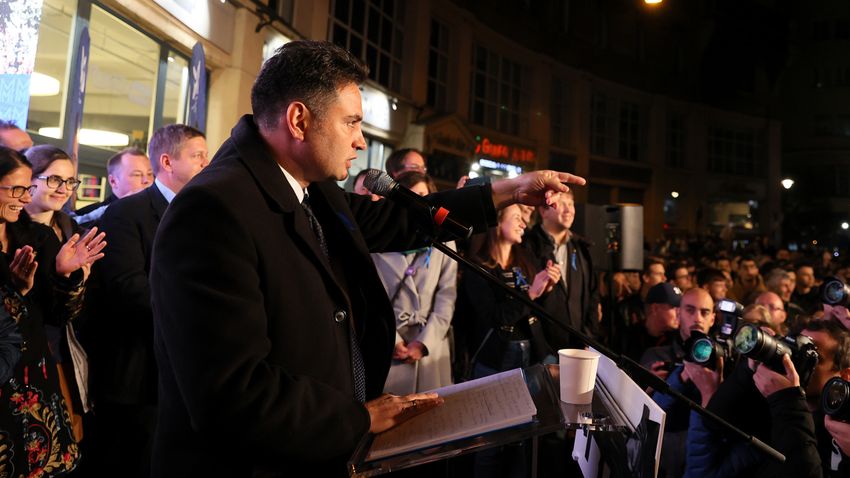
Leftist PM candidate disdains voters' views
Another video has emerged featuring the Hungarian left wing's PM candidate as he supports co-pay fees on both GP visits and on in-patient hospital stays. The idea of a pay-as-you-use healthcare was already rejected by a large majority of Hungarians in a referendum, showing that the candidate has no regard for people's views.
The Origo news portal draws attention to yet another speech from the past by the Hungarian left wing’s prime ministerial candidate, Peter Marki-Zay, in which he supports the introduction of the so called „co-pay fees on GP visits” and the so called „hospital per diem” fees. In this Facebook video, Mr Marki-Zay argues that the 2008 social referendum initiated by the Fidesz party – then in opposition –, in which the vast majority of Hungarians rejected the notion of individual co-payment fees in national healthcare, was invalid and in fact could not have been held because it affected the budget (this is not the case, as the regulation on referendums only forbids plebiscites on issues impacting budget revenue spending). Origo points out that
Marki-Zay has made statements on several occasions indicating that he is utterly insensitive to people’s everyday problems.
In the recently republished 2019 video the Hungarian left’s PM candidate appears to be criticising the referendum initiated by the Fidesz party in 2008, in which the pay-as-you-use charges on healthcare services had been definitively rejected by a large majority of Hungarians.
“Remember when one of the significant moves by Fidesz in overthrowing the Gyurcsany government was (…) calling a referendum on a tax issue, which, rather strangely and surprisingly, was approved by the Constitutional Court (AB) of the time. This is not possible in civilised countries,” explained Mr Marki-Zay – currently considered Gyurcsany’s candidate – on the day of the latest European parliamentary elections.
He also labelled the top court’s (AB) decision ‘strange and surprising’, arguing that by way of legal definition, no referendum can be held on a subject affecting the budget.
However, the PM-hopeful has again managed to say an untruth: the plebiscite held in 2008 did not in any way conflict with the Constitution of Hungary. After all, as the Constitutional Court had explained in its reasoning, only questions involving budgetary expenditures cannot be decided by referendum; the ‘GP visit fee’ and the other items did not fall into this category: they are not about spending existing state revenues, but are forms of imposing new types of taxes.
It is important to emphasize that
in the 2008 social referendum, Hungarians decided about issues that were crucial to everyone, as many people on low income feared that they could lose access to the most basic healthcare services in the country driven to the brink of bankruptcy by Ferenc Gyurcsany, socialist prime minister at the the time.
This could have been the main reason for reaching a wide consensus in the plebiscite: with a turnout higher than 50 per cent, four-fifths of voters rejected the introduction of special tariffs for the GP’s visit and the daily hospitals fees (and they also rejected the introduction of tuition fees in higher education, also a question on the referendum sheet).

Demonstration against hospital closures and the health policy of the Gyurcsany government in 2007. Source: Origo
It is noteworthy that the Hungarian Medical Chamber did not support the charge for GP visits or the daily fee for hospital care, arguing that the their introduction would not have significantly increased the income of hospitals and the salaries of doctors, nor would it have changed people’s attitude towards gratitude payments to medical practitioners. In addition, many doctors believed that charging a fee for consulting a practitioner – which could have amounted to a thousand forints (appr. 4 euros at the time) per occasion depending on health needs – was contrary to the medical oath.
It comes as no surprise that despite all these circumstances, Mr Marki-Zay stressed that the 2008 referendum should not even have been called, as he has demonstrated his insensitivity to issues affecting people’s livelihoods and everyday lives on multiple occasions. It will suffice to refer to some of his statements attacking, for example, utility bill cuts, the cap on petrol prices or the rise in minimum wages. In yet another statement, he said that if opposition parties came to power, they would repeal the child protection law, regardless of the outcome of the popular vote on the subject.
Origo also recalls that Mr Marki-Zay would transform the healthcare system to rest on a business basis and made clear that medical services would go into the hand of profit-oriented companies. During Ferenc Gyurcsany’s term as prime minister, the left wing made several attempts at privatisation, but the model clearly failed. Before 2010, during the left-wing governments, several municipalities found themselves in a dire situation after they had concluded privitisation contracts with private companies – Hospinvest, for instance – to operate local hospitals, and when these businesses went bankrupt, they left not only huge debts to the municipalities, but also reclaimed development costs subsequently. This is what happened to towns such as Eger, Hatvan or Gyongyos.

